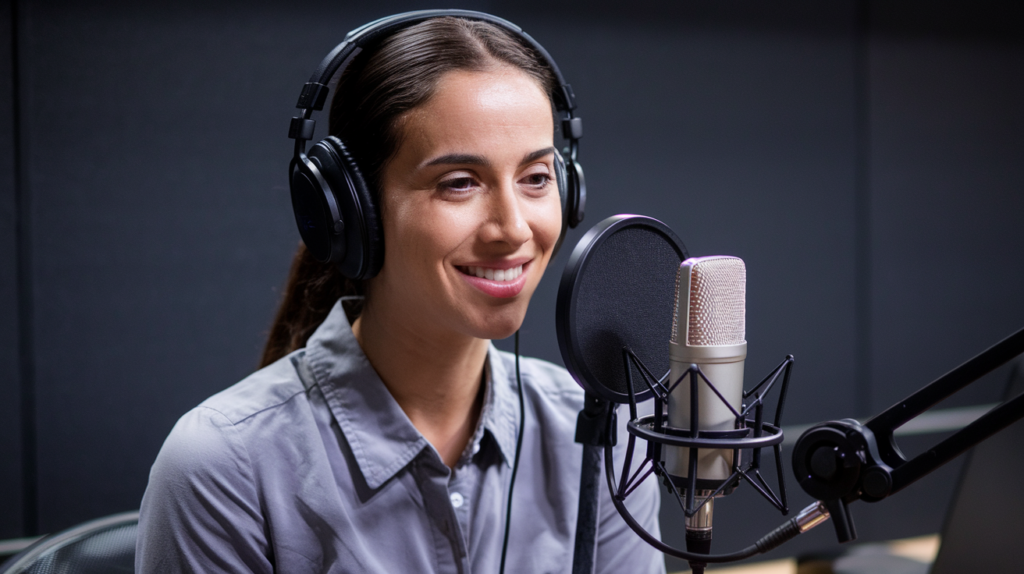Key Takeaways
- Mastery of tricky sounds, such as nasal vowels and specific consonants, is essential for authentic Brazilian Portuguese voice acting.
- Regional accents significantly influence voiceover performances; understanding these variations enhances connection with audiences.
- Regular practice with vocal exercises and techniques can improve pronunciation and clarity in challenging phonetic areas.
- Engaging with native speakers provides valuable feedback that helps refine skills and navigate the subtleties of the language.
- Diction coaches offer expert guidance on phonetics, helping voice actors develop a more nuanced delivery and build confidence in their performances.
Ever tried mastering the tricky sounds in Brazilian Portuguese voice acting? You’re not alone. Many aspiring voice actors find themselves stumbling over those unique phonetics that can make or break a performance.
Overview of Voice Acting in Brazilian Portuguese
Voice acting in Brazilian Portuguese presents unique opportunities and challenges. Understanding the distinct phonetics is crucial for voice actors aiming to deliver authentic performances. This language features a variety of sounds, including nasal vowels and specific consonant pronunciations that differ from other languages.
Brazilian Portuguese has regional accents that can significantly impact voiceovers. These accents add depth but can also complicate the performance if not mastered. A voice talent must recognize these nuances to connect with audiences effectively.
The demand for skilled voice artists continues to grow across various industries, such as animation, advertising, and video games. Clients seek voice talents who can convey emotion and personality through their work. Mastery of tricky sounds ensures a more engaging final product.
Aspiring voice actors should focus on vocal exercises that target challenging phonemes unique to Brazilian Portuguese. Techniques like repetition and mimicry help develop an ear for these sounds, enhancing overall delivery in recordings.
Investing time in practicing with native speakers can further refine your skills. Feedback from experienced professionals is invaluable when navigating the subtleties of this vibrant language.
Embracing the intricacies of Brazilian Portuguese will elevate your abilities as a voice over actor, making you a sought-after choice for clients seeking high-quality performances.
Understanding Tricky Sounds
Mastering the tricky sounds in Brazilian Portuguese is essential for any voice actor aiming for authenticity. You’ll find that the language’s unique phonetics can present both challenges and opportunities in your performances.
Nasal Vowels
Nasal vowels are a defining feature of Brazilian Portuguese. These sounds occur when air flows through the nose during pronunciation, creating distinct vowel qualities. For instance, words like “mãe” (mother) or “pão” (bread) showcase nasalization effectively. Practicing these vowels involves listening to native speakers and imitating their pronunciation until you capture the subtle nuances. Remember, nailing these sounds adds depth to your voiceover work, making characters more relatable and engaging.
Sibilants and Affricates
Sibilants and affricates also play a crucial role in Brazilian Portuguese phonetics. The sibilant sounds like “s,” “z,” and “sh” can vary significantly in different contexts, impacting how you deliver lines. For example, consider how “c” before an “e” or “i” produces a soft sound similar to English’s “s.” Meanwhile, affricates such as “tch” in “tchau” (bye) require specific tongue placements that may feel unfamiliar at first. Regular practice with these sounds will enhance your clarity as a voice artist, helping you communicate emotions effectively during recordings.
Embracing these tricky aspects of Brazilian Portuguese not only refines your skills but also positions you as a versatile voice talent capable of delivering high-quality performances across diverse projects.
Common Challenges for Voice Actors
Voice acting in Brazilian Portuguese poses specific challenges that can impact performance quality. Understanding these hurdles is vital for any voice actor aiming to deliver authentic and compelling voiceovers.
Pronunciation Differences
Pronunciation in Brazilian Portuguese features distinct sounds not found in English, such as nasal vowels. These phonemes can trip up even seasoned voice artists. For instance, the way you articulate words like “pão” (bread) or “mãe” (mother) requires a nuanced approach to ensure clarity. Mispronouncing these terms may lead to misunderstandings or a lack of emotional resonance in your delivery. Practicing with native speakers offers invaluable insights into proper pronunciation and intonation patterns.
Regional Accents and Variations
Brazilian Portuguese has numerous regional accents that enrich the language but complicate voiceover work. From the soft, melodic tones of Rio de Janeiro to the guttural sounds of São Paulo, each accent adds depth yet demands mastery from voice actors. If you’re unaware of these variations, you might struggle to connect authentically with your audience. Familiarizing yourself with different accents enhances versatility as a voice artist and broadens your appeal across diverse projects.
By honing your skills around these common challenges, you position yourself as an effective voice over talent capable of captivating listeners with every performance.
Techniques to Master Tricky Sounds
Mastering tricky sounds in Brazilian Portuguese enhances your capabilities as a voice actor. Embracing these techniques can refine your skills and boost your confidence.
Phonetic Exercises
Phonetic exercises focus on specific sounds that challenge many voice actors. These exercises help you articulate nasal vowels and sibilants more clearly. For instance, practice the word “pão” (bread) by repeating it slowly, emphasizing the nasal quality. Use tongue twisters like “O rato roeu a roupa do rei de Roma” to improve your agility with consonant clusters. Recording yourself while practicing allows you to hear improvements and identify areas needing work.
Vocal Warm-ups and Techniques
Vocal warm-ups prepare your voice for performance, ensuring clarity and resonance. Start each session with simple humming or lip trills to relax your vocal cords. Gradually introduce scales using various vowel sounds, paying special attention to how they change in different words. Techniques like diaphragmatic breathing support sustained sound production—essential for long recording sessions or live performances.
Using these strategies consistently not only boosts your pronunciation but also makes you more versatile as a voice artist. Engaging with native speakers through conversation can further enhance familiarity with regional accents and phonetic nuances that define Brazilian Portuguese, helping you stand out in the competitive world of voiceovers.
The Role of Diction Coaches
Diction coaches play a vital role in helping voice actors navigate the tricky sounds of Brazilian Portuguese. These professionals specialize in phonetics and articulation techniques, guiding you through the complexities of language nuances. They focus on refining your pronunciation, ensuring every word resonates with clarity.
Diction coaches provide targeted exercises that address specific challenges like nasal vowels and sibilants. You can expect personalized feedback that highlights areas for improvement, which enhances your overall performance quality. For instance, practicing words like “pão” or “mãe” under their guidance can deeply impact your emotional delivery.
Moreover, diction coaches often introduce techniques to improve vocal agility. Tongue twisters become a fun way to master consonant clusters while warming up your voice. With their support, you’ll develop a more authentic connection with audiences by embracing regional accents and dialects.
Engaging with a diction coach not only sharpens your skills but also boosts confidence. As you refine your craft alongside an expert, you’ll find yourself better equipped for various projects in animation, advertising, or video games. Their knowledge helps you stand out as a skilled voice artist capable of captivating listeners with every performance.
Ultimately, investing time with a diction coach elevates your abilities as a voice actor and strengthens your appeal to potential clients seeking high-quality voiceovers. By mastering these intricate sounds together, you’re setting yourself on the path to success in the competitive world of voice acting.
Conclusion
Mastering tricky sounds in Brazilian Portuguese is a rewarding journey that can significantly enhance your voice acting skills. By focusing on the nuances of nasal vowels and regional accents, you’ll not only improve your pronunciation but also connect more authentically with your audience.
Embracing these unique phonetics opens doors to diverse projects in animation, advertising, and gaming. With dedication to practice and guidance from diction coaches, you’ll refine your abilities and stand out in a competitive field. Keep pushing through the challenges you face; each step forward brings you closer to delivering captivating performances that resonate with listeners.
Frequently Asked Questions
What are the main challenges in voice acting for Brazilian Portuguese?
Aspiring voice actors face unique phonetic challenges, such as mastering nasal vowels and specific consonant pronunciations. Additionally, understanding regional accents is crucial for authentic performances. Mispronunciations can lead to misunderstandings or lack of emotional resonance, making mastery essential for success.
How can I improve my pronunciation in Brazilian Portuguese?
To enhance your pronunciation, focus on vocal exercises that target challenging sounds like nasal vowels and sibilants. Practice with native speakers and utilize tongue twisters to build agility with consonant clusters. Engaging regularly will boost clarity and emotional delivery in your performances.
Why are regional accents important in Brazilian Portuguese voice acting?
Regional accents add depth to performances but complicate voiceovers if not mastered. Each accent carries distinct phonetic traits that influence how words are pronounced, impacting audience connection. Understanding these variations is key to delivering authentic and relatable character portrayals.
How can a diction coach help aspiring voice actors?
Diction coaches specialize in phonetics and articulation techniques, offering personalized feedback and targeted exercises to refine pronunciation. They introduce methods like tongue twisters for mastering consonant clusters while boosting vocal agility and confidence—essential skills for effective voice acting.
What techniques should I practice for mastering Brazilian Portuguese phonetics?
Focus on phonetic exercises that emphasize nasal vowels and sibilants. Incorporate warm-ups like humming or lip trills to prepare your voice, along with diaphragmatic breathing techniques for sustained sound production. Consistent practice will help you become more familiar with the language’s intricacies.
Is there a growing demand for voice artists skilled in Brazilian Portuguese?
Yes, there is an increasing demand for talented voice artists in fields such as animation, advertising, and video games who can convey emotion effectively. Clients seek performers capable of connecting authentically through their voices across diverse projects using proper language nuances.







